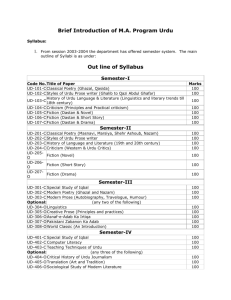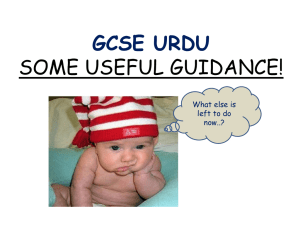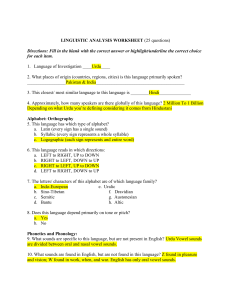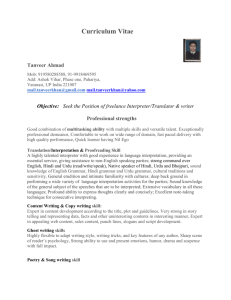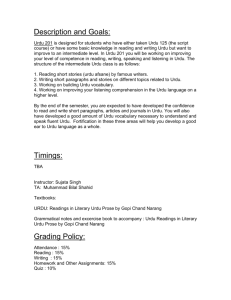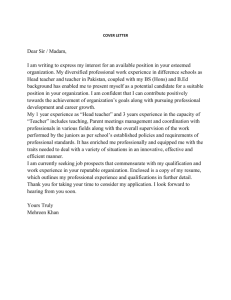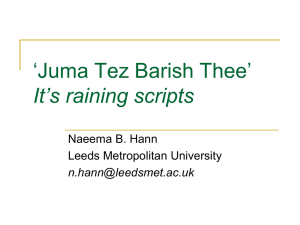Intermediate Urdu - University of Wisconsin
advertisement
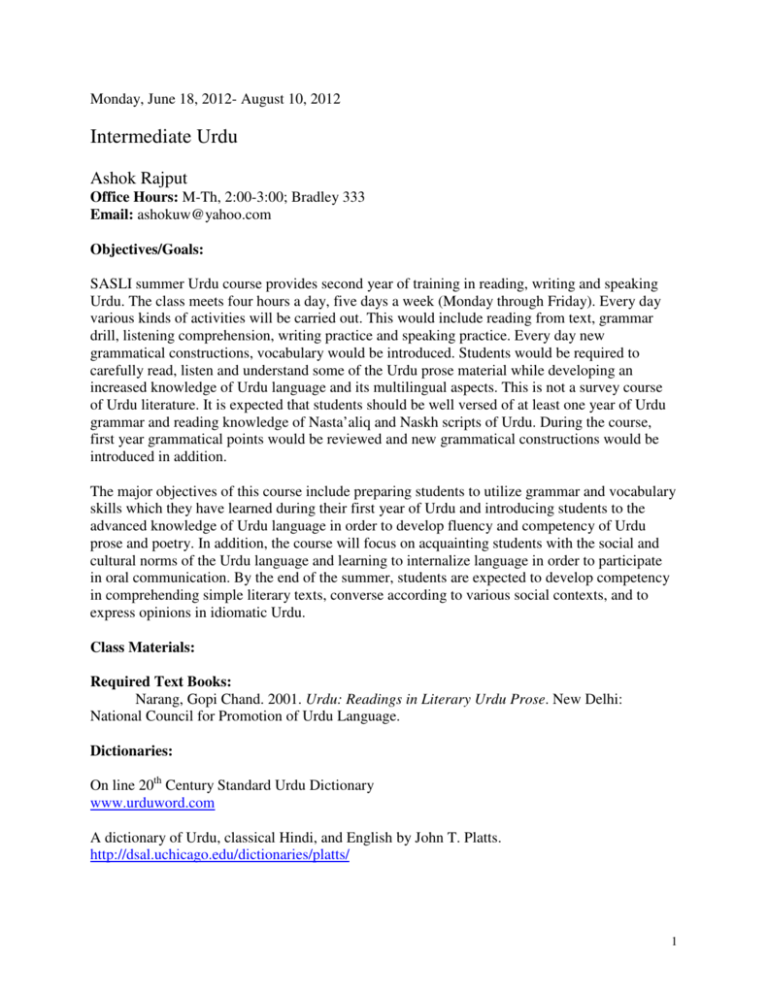
Monday, June 18, 2012- August 10, 2012 Intermediate Urdu Ashok Rajput Office Hours: M-Th, 2:00-3:00; Bradley 333 Email: ashokuw@yahoo.com Objectives/Goals: SASLI summer Urdu course provides second year of training in reading, writing and speaking Urdu. The class meets four hours a day, five days a week (Monday through Friday). Every day various kinds of activities will be carried out. This would include reading from text, grammar drill, listening comprehension, writing practice and speaking practice. Every day new grammatical constructions, vocabulary would be introduced. Students would be required to carefully read, listen and understand some of the Urdu prose material while developing an increased knowledge of Urdu language and its multilingual aspects. This is not a survey course of Urdu literature. It is expected that students should be well versed of at least one year of Urdu grammar and reading knowledge of Nasta’aliq and Naskh scripts of Urdu. During the course, first year grammatical points would be reviewed and new grammatical constructions would be introduced in addition. The major objectives of this course include preparing students to utilize grammar and vocabulary skills which they have learned during their first year of Urdu and introducing students to the advanced knowledge of Urdu language in order to develop fluency and competency of Urdu prose and poetry. In addition, the course will focus on acquainting students with the social and cultural norms of the Urdu language and learning to internalize language in order to participate in oral communication. By the end of the summer, students are expected to develop competency in comprehending simple literary texts, converse according to various social contexts, and to express opinions in idiomatic Urdu. Class Materials: Required Text Books: Narang, Gopi Chand. 2001. Urdu: Readings in Literary Urdu Prose. New Delhi: National Council for Promotion of Urdu Language. Dictionaries: On line 20th Century Standard Urdu Dictionary www.urduword.com A dictionary of Urdu, classical Hindi, and English by John T. Platts. http://dsal.uchicago.edu/dictionaries/platts/ 1 Other: Besides selections from Narang’s text, required readings will also include selections from Naim’s Introductory Urdu, and selections from current Urdu newspapers and magazines, and other handouts. Recommended Text Books: Schmidt, Ruth Laila. 1999. Urdu: An Essential Grammar. New York: Routledge. This is an excellent companion to Urdu grammar. I highly recommend it for reference. Materials to be provided: Weekly handouts, worksheets, exercises Audio: 1 CD for listening comprehension. Content: In this course, students would be reading some of the short stories, selected couplets from Urdu poems and ghazals, and newspapers and magazine headlines. During each meeting students would come prepared and discuss the assigned reading in detail in Urdu. Students would also watch some of the films and television plays in order to understand the spoken Urdu. Please don’t hesitate speaking Urdu. This way you will learn new vocabulary and Urdu Syntax. Daily homework assignments will include listening comprehension exercises. During the course of the summer you will watch clips of an Urdu television drama on DVD. Exercises for this drama and relevant vocabulary will be distributed in class. In your listening comprehension session, you will be utilizing these exercises. Students would also be asked to write weekly journals and short essays on selected topics in Urdu. There will be five weekly short quizzes in class and daily and weekly home assignments. Final exam in the eighth week will have oral and written components. There will be weekly oral presentations based on the content of that week’s work. Grading: Five Quizzes: Class Participation: Homework (weekly journal, daily exercises): One Exam (Exam includes spoken/oral proficiency): Final Project: SASLI Performance Percentage 25% 10% 15% 15% 25% 10% 2 Attendance Policy: Students should be punctual, and attend both the morning and afternoon sessions every day in order to receive a full grade for the course. If, for any reason, a student is unable to come to class, he or she should discuss this with the instructor beforehand. Homework: Students will be required to keep a weekly journal. Students should write 10-15 sentences (minimum 1 page daily) in their journal. Students will be given handouts, daily grammar exercises, and vocabulary drills for homework, to be handed in daily to the instructors. Grading/Assessment (Based on two 4 week semesters): Grading Policy: 93-100 = A 88-92 = A-/B+ 83-87 = B 78-82 = BC 70-77 = C 60-69 = D below 59 = F McBurney Disability Resource Center: The McBurney Center is available for all students at the University of Wisconsin. The Center offers a wide array of services for students with Disabilities. If you are in need of any of the services provided by the Center, please feel free to contact the McBurney Center staff directly. For a list of the services provided, please visit the website: http://www.mcburney.wisc.edu/services/ Contact information for the McBurney Disability Resource Center: 905 University Avenue Madison, WI 53715 608-263-2741 (phone) 263-6393 (tty) 265-2998 (fax) mcburney@uwmadmail.services.wisc.edu Student Code of Conduct: The student Academic Misconduct Policy & Procedures for the University of Wisconsin is available on the website listed below: http://www.wisc.edu/students/conduct/conduct.htm This document outlines the rules and regulations regarding your student rights and responsibilities while a student at the University of Wisconsin-Madison. It states that "Academic misconduct is an act in which a student: 3 • • • • • • seeks to claim credit for the work or efforts of another without authorization or citation; uses unauthorized materials or fabricated data in any academic exercise; forges or falsifies academic documents or records; intentionally impedes or damages the academic work of others; engages in conduct aimed at making false representation of a student's academic performance; assists other students in any of these acts." Please see the website listed above for further information. Structure/Schedule: Weekly schedules of classroom activity, assignments of reading for prior preparation, and written assignments will be given at the beginning of each week. Week 1 Monday, June 18, 2012 Classroom Conversation; Introduction: Where are you from; Where and How is your family? What do you do? Where do you live? Where were you last year? Classroom Reading: Questions about yourself. Homework: Journal Entry 1; Writing Essay: Write an essay about yourself. Tuesday, June 19, 2012 Classroom Conversation: Discussion about Urdu and Pakistan Some grammar and distribution of Quick Reference Grammar Handout Homework: Journal Entry 2; Writing Essay: Write an essay on “My Vacation in Pakistan. Wednesday, June 20, 2012 Classroom Conversation Some Grammar Points; Perfective; Future, Helping/Modal Verbs Classroom Reading Indus River Homework: Journal Entry 3, and Translation of Indus River; and Reading of Some Stories: " ! Thursday, June 21, 2012 Classroom Conversation and Meeting with Individual Students Homework: Journal Entry 4; Prepare for Reading of Stories in Classroom Friday, June 22, 2012 Classroom Conversation Grammar points on Impersonal Sentences, and Modal Verbs &'(#$ $% 4 Classroom Reading: ,./* ) * Homework: Journal Entry 5, Prepare for Song on Monday, and Quiz on Tuesday Memorize Vocabulary of Readings from Some Stories, Indus River and ,./* )* for first Quiz on Tuesday, June 26, 2012 Week 2 Monday, June 25, 2012 Classroom Conversation, Listening Comprehension and Classroom Reading Song 1 Practice Homework: Journal Entry 6, Quiz Preparation Tuesday, June 26, 2012 Quiz 1 Classroom Conversation Listening Comprehension and Some Grammar Points Homework: Journal Entry 7 Writing Essay: Write an essay about things that you wish to do, have not accomplished but like to do in the future. Due Wednesday, June 27 Wednesday, June 27, 2012 Classroom Conversation Listening Comprehension and Some Grammar Points Classroom Reading Homework: Journal Entry 8, and Translation from English to Urdu Reading of Some Stories: _________ Writing Essay: Write an essay about a place (a house, a building). Due Thursday, June 28 Thursday, June 28, 2012 Meeting and Conversation with Individual Students Homework: Journal Entry 9 Prepare for Reading of Stories in Classroom Friday, June 29, 2012 Listening Comprehension and Some Grammar Points; Classroom Reading Homework: Journal Entry 10, Writing Essay: Write an essay about a city This week will cover following grammar points: Compound Verbs; Intransitive, Transitive and Causative Verbs, Comparatives and Superlatives, Subjunctives, Presumptive 5 This year I am writing a new syllabus, and including new reading and listening material. I am continuing this on weekly basis. By the end of seven weeks, I will be in a position to finalize the weekly schedule of the material. Here is, however, old weekly work from 2011 that is also incorporated in 2012. Week 1 Introduction to the Course; Review of Grammar; Nouns and their Oblique forms; Adjectives and their oblique forms; Postpositions; Tenses; Imperatives; Habitual; Past; Future; Modal Verbs; Time Constructions Writing Exercise: Week 2 Indirect Cases; Compulsion; Comparatives and Superlatives; Cardinal and Ordinal Numbers; Relative Co-Relative Clauses; Quiz 1 Writing Exercise: Week 3 Subjunctive; Conditional; Presumptive; Reflexive Pronouns; Quiz 2 Writing Exercise: Week 4 Compound Verbs; Causative; Transitive; Intransitive Verbs; Four-Week Exam Writing Exercise: Read Gopichand Narang Week 5 Participles; Passive construction Writing Exercise: For Grammar Points Read Schmidt Read Gopichand Narang Week 6 Read Gopichand Narang; Quiz 4 Writing Exercise: Week 7 Read Gopichand Narang; Quiz 5 Newspapers and Magazines; Final Exam 6


